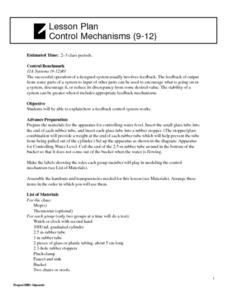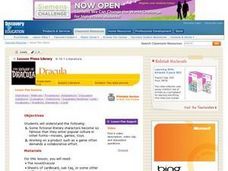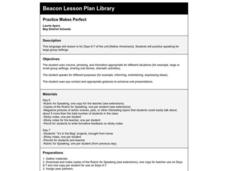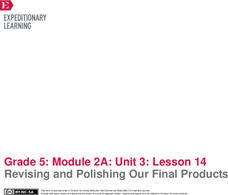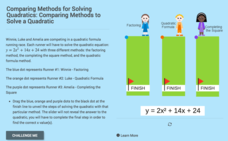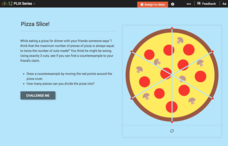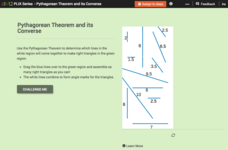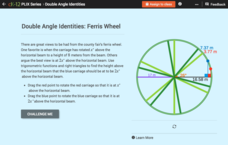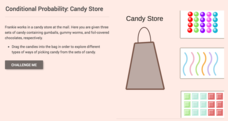Curated OER
Control Mechanisms
High schoolers explain how a feedback control system works. They model a feedback control mechanism for controlling water level by observing the flow rate of water in a cylinder. In addition, they graph their data. Script for lesson...
Curated OER
The Teller of the Tale, Part 3
Students practice use of volume, stress, pacing, enunciation, eye contact, and gestures needed to meet the needs of the audience when presenting their own tales based on Chaucer. They receive teacher and student feedback and prepare to...
Curated OER
Choose Your Path
Middle schoolers identify the plot and theme of cartoons. In groups, they discuss and compare the written and movie versions of popular fairy tales. Individually, they write their own fairy tale and share them with the class. They...
Curated OER
The Dracula Game
Young scholars discuss ways in which the story "Dracula" can be viewed in terms of a board game. After discussion, groups create and illustrated game board, pieces, and written rules for their own version of The Dracula Game. Groups...
Curated OER
Practice Makes Perfect
And the consensus says...Teach your class to use peer feedback to refine public speaking skills. They cut out a magazine picture and develop an oral story about it to present to the class. They share several meaningful objects with the...
PBS
What Makes A Good Video Report?
As part of a media literacy unit, class members establish criteria for good video reporting, and practice giving both positive (warm) and constructive (cool) criticism.
Curated OER
Latin Roots Dict, Vent, Duct: Beginning Quiz
Learners fill in the blanks for 12 sentences with words derived from the Latin roots dict, vent, and duct in an interactive online quiz. A word bank provides choices from the beginning level at MyVocabulary.com. Alert quiz takers that...
CK-12 Foundation
Parallel and Skew Lines: Parallel or Not?
There's nothing askew about an informative resource. Pupils adjust one of two lines in an interactive to determine if the lines are parallel or skew. They answer a set of challenge questions about the lines.
EngageNY
Revising and Polishing Our Final Products
One, two, three go! Scholars work independently to finalize the three components of their final task. They complete a science journal entry, scientific text box, and scientific drawing. While working, learners sign up for an appointment...
CK-12 Foundation
Matrix Multiplication: Vectors
Visualize matrix multiplication on the coordinate plane. Pupils use the interactive to create a matrix multiplication problem using vectors. The scholars see the resulting product of the matrices as a vector.
CK-12 Foundation
Radian Measure: Unit Circle Conversions
Individuals investigate the relationship between radian and angle measurements by using an interactive to find the angle measurement for given radian measures. Users answer questions to convert between the two measurements.
CK-12 Foundation
Comparing Methods for Solving Quadratics: Comparing Methods to Solve a Quadratic
Determine the quickest process for solving quadratics. Pupils compare the number of steps in the process of solving quadratics using three different methods. Scholars determine which situations lend themselves to the different solving...
CK-12 Foundation
Using Quadratic Equations to Solve Problems: Pizza Slice!
Get the most out of a pizza. Class members use an interactive to simulate cutting a pizza to determine the maximum number of slices possible. The pupils create a set of data points and determine the equation that models the relationship.
CK-12 Foundation
Rotations in Radians: Clock Conundrum
Pupils use an interactive clock to set specific times. They apply math to an everyday task as they determine the measure of the angle formed by the hands in degrees and in radians.
CK-12 Foundation
Joint and Combined Variation: Variable Sliders
Learners use a pair of sliders to investigate how changes in a variable affects other variables in joint variation. A set of five challenge questions tests understanding.
CK-12 Foundation
Pythagorean Theorem and Its Converse
To be a right triangle, or not to be — that is the question. Scholars drag line segments in an Internet application to see if they form right triangles. Once they get the results of the activity, they connect them to the converse of the...
CK-12 Foundation
Double Angle Identities: Ferris Wheel
Use a Ferris wheel to soar to new heights of understanding on double angle identities. Here is an interactive that applies an example of a Ferris wheel to show how doubling the angle does not double the value of a trigonometric ratio....
CK-12 Foundation
Law of Cosines: Get on Base
Baseball is all about math. Young baseball and mathematics enthusiasts determine the distance between players on a baseball field using the Law of Cosines. An interactive helps them find relevant distances and angles to use in their...
CK-12 Foundation
Alternate Formula for the Area of a Triangle: Alternate Area of a Triangle
It's always nice to have a plan B. Pupils investigate an alternate formula for the area of a triangle that uses sine. A set of challenge questions shows how the new formula relates to the well-known formula of (1/2)bh.
CK-12 Foundation
Vector Addition
View vector addition with a greater magnitude. The interactive provides learners with the opportunity to determine the magnitude of vectors and their resultant vectors when added. Pupils investigate the relationship between the...
CK-12 Foundation
Distance Between Two Polar Coordinates: Exploring Changes in Angle and Radius
Get straight answers on a curved grid. An interactive has learners apply the Law of Cosines to find the distance between two points on the polar coordinate plane. The pupils use the radii lengths and the angle between the two radii to...
CK-12 Foundation
Conditional Probability: Candy Store
An interactive uses a candy store to involve the pupils in conditional probabilities. Learners determine probabilities as customers purchase different types of candies and the stock decreases.
CK-12 Foundation
Scientific Models: Mathematical, Physical and Conceptual
This is one super model interactive! Middle and high school science scholars examine scientific models through a simple resource. Guided, hands-on practice allows them to classify conceptual, mathematical, and physical models. Other...
CK-12 Foundation
Topographic and Geologic Maps: Topographic Maps
Maps are great for helping you get where you're going, but what does that place actually look like? Geology scholars compare and contrast the features of topographical and geologic maps using an interactive lesson. The resource describes...
Other popular searches
- Negative Feedback
- Feedback Loops
- Feedback Control
- Feedback Coordination
- Feedback Mechanisms
- Constructive Feedback
- Negative Feedback Loops
- Press Conference Feedback
- Positive Feedback
- Hormone Negative Feedback
- Peer Feedback
- Negative Feedback Mechanisms


